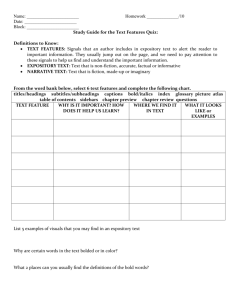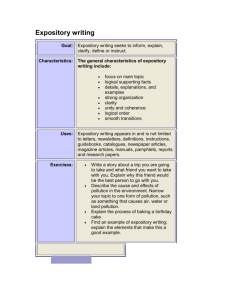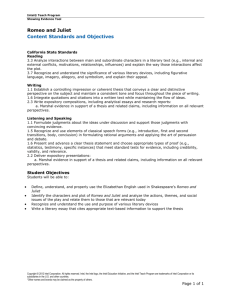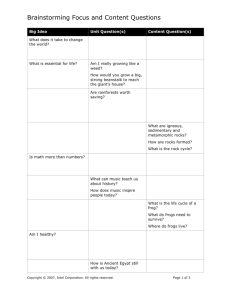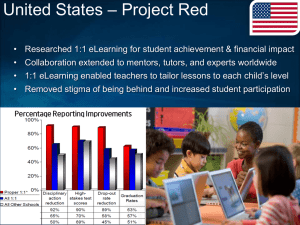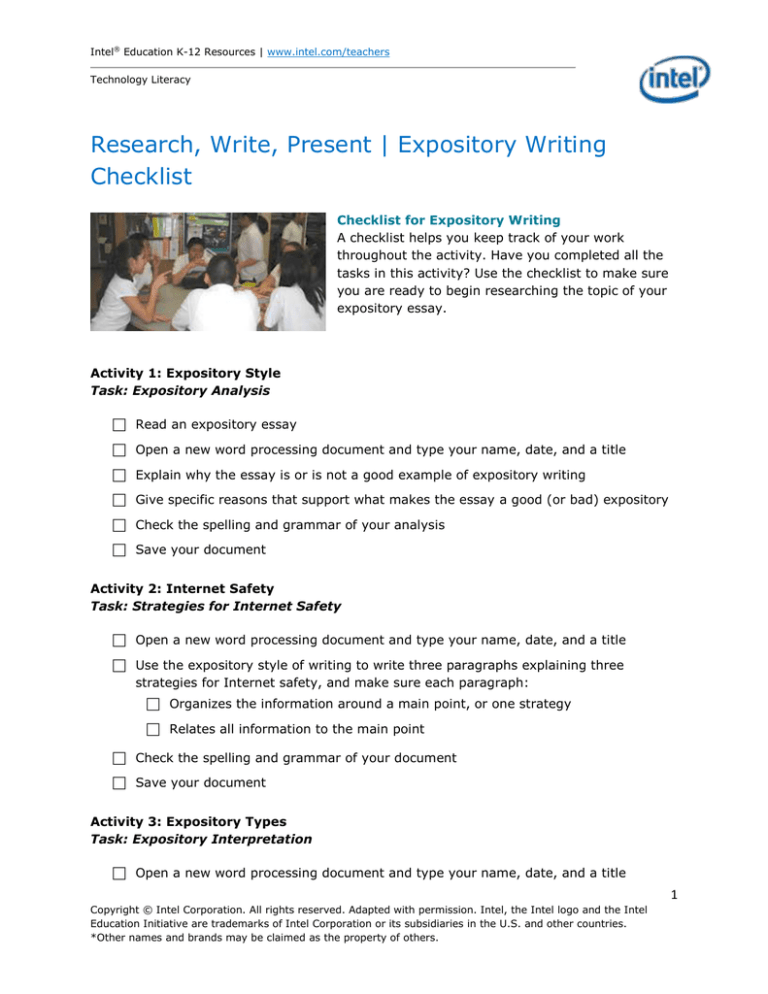
Intel® Education K-12 Resources | www.intel.com/teachers
Technology Literacy
Research, Write, Present | Expository Writing
Checklist
Checklist for Expository Writing
A checklist helps you keep track of your work
throughout the activity. Have you completed all the
tasks in this activity? Use the checklist to make sure
you are ready to begin researching the topic of your
expository essay.
Activity 1: Expository Style
Task: Expository Analysis
Read an expository essay
Open a new word processing document and type your name, date, and a title
Explain why the essay is or is not a good example of expository writing
Give specific reasons that support what makes the essay a good (or bad) expository
Check the spelling and grammar of your analysis
Save your document
Activity 2: Internet Safety
Task: Strategies for Internet Safety
Open a new word processing document and type your name, date, and a title
Use the expository style of writing to write three paragraphs explaining three
strategies for Internet safety, and make sure each paragraph:
Organizes the information around a main point, or one strategy
Relates all information to the main point
Check the spelling and grammar of your document
Save your document
Activity 3: Expository Types
Task: Expository Interpretation
Open a new word processing document and type your name, date, and a title
1
Copyright © Intel Corporation. All rights reserved. Adapted with permission. Intel, the Intel logo and the Intel
Education Initiative are trademarks of Intel Corporation or its subsidiaries in the U.S. and other countries.
*Other names and brands may be claimed as the property of others.
Intel® Education K-12 Resources | www.intel.com/teachers
Technology Literacy
Find an example of writing in a subject that interests you
Write two or three paragraphs explaining how the example uses the expository style
of writing, and make sure to include:
The types of expository writing used
Specific instances of effective expository writing, including:
A specific topic
A first paragraph that clearly states the topic and purpose
Paragraphs organized around a main point
Information in paragraphs that relate to the main point
Paragraphs arranged in a logical order
A last paragraph that is a summary
An explanation of what you learned about the topic
Check the spelling and grammar of your interpretation
Save your document
Activity 4: Topic Choice
Task: Expository Topic Selection
Open a new word processing document and type your name, date, and a title
Choose a topic for an expository essay
Check that the topic you chose is:
Interesting to you
Informative to others
Something you can explain
Appropriate for the assignment
Specific
Researchable
Make sure your topic can be explained using one or more of the expository styles,
and check the styles you plan to use:
Cause and effect
Classify and divide
Compare and contrast
Definition
2
Copyright © Intel Corporation. All rights reserved. Adapted with permission. Intel, the Intel logo and the Intel
Education Initiative are trademarks of Intel Corporation or its subsidiaries in the U.S. and other countries.
*Other names and brands may be claimed as the property of others.
Intel® Education K-12 Resources | www.intel.com/teachers
Technology Literacy
Process
Write a few paragraphs describing the topic and explaining:
Why you chose the topic
What you want to explain
Whom you want to inform
What type of expository writing you can use to explain the topic
Who the narrator is and the narrator’s point of view
What you need to know about the topic to write an expository essay
Check the spelling and grammar of your document
Save your document
Activity 5: Research Questions
Task: Questions
Open a new word processing document and type your name, date, and a title
Write a few questions to guide your research for your expository essay
Include different types of questions, including:
Factual: To help you understand the topic
Convergent: To delve deeper into the topic
Divergent: To understand different aspects of the topic
Evaluative: To understand different points of view on the topic
Be sure that your questions address the following:
Why you chose the topic
What facts you need to know to understand the topic
What type of research questions will provide the facts
What different points of view are held on the topic
What type of research questions will help you understand the different
points of view
Check the spelling and grammar of your questions
Save your document
3
Copyright © Intel Corporation. All rights reserved. Adapted with permission. Intel, the Intel logo and the Intel
Education Initiative are trademarks of Intel Corporation or its subsidiaries in the U.S. and other countries.
*Other names and brands may be claimed as the property of others.
Intel® Education K-12 Resources | www.intel.com/teachers
Technology Literacy
Rubric
Rubric for Expository Writing
The main purpose of a rubric is to help you do your best work. What column best describes
your research questions and expository topic? Is all of your work best described by column
4? If not, what can you improve?
Research
Questions
4
3
2
1
Questions are
relevant and
engaging, and
provoke thought on
all important
aspects of the
topic.
Questions are
relevant, engaging,
and address all
important aspects of
the topic.
Questions are
relevant but do not
address some
important aspects
of the topic.
Many questions are
not relevant to the
topic.
Questions provide all
information needed
for the chosen type
of expository
writing.
Questions provide
some appropriate
information for the
chosen type of
expository writing.
Questions provoke
thought on all
information needed
for the chosen type
of expository
writing.
Topic Choice
Writing
Mechanics
The topic is focused The topic is focused
and interesting to
and interesting to
most readers.
some readers.
The chosen type of
expository writing
is the best way to
approach the topic.
The chosen type of
expository writing is
a good way to
approach the topic.
All words are
spelled and
capitalized
correctly.
Almost all words are
spelled or capitalized
correctly.
All sentences are
punctuated
correctly.
Almost all sentences
are punctuated
correctly.
Many questions
would be more
appropriate for
another type of
expository writing.
The topic is focused
but may not be
interesting to
readers.
The topic is too
broad to be
covered
adequately.
The chosen type of
The chosen type of expository writing
expository writing is is not a good way
one way to
to approach the
approach the topic, topic.
but it is not the
best way.
Several words are
misspelled or
capitalized
incorrectly.
Many words are
misspelled and
capitalized
incorrectly.
Several sentences
are punctuated
incorrectly.
Many sentences
are punctuated
incorrectly.
4
Copyright © Intel Corporation. All rights reserved. Adapted with permission. Intel, the Intel logo and the Intel
Education Initiative are trademarks of Intel Corporation or its subsidiaries in the U.S. and other countries.
*Other names and brands may be claimed as the property of others.
Intel® Education K-12 Resources | www.intel.com/teachers
Technology Literacy
File
Management
Files are clearly
named, consistently
saved to the correct
location, and wellorganized in
folders.
Files are clearly
named and
consistently saved to
the correct location,
but they are not
well-organized in
folders.
Work is not lost,
but files are not
clearly named or
consistently saved
to the correct
location.
Work is lost
because files are
not clearly named
or consistently
saved to the
correct location.
5
Copyright © Intel Corporation. All rights reserved. Adapted with permission. Intel, the Intel logo and the Intel
Education Initiative are trademarks of Intel Corporation or its subsidiaries in the U.S. and other countries.
*Other names and brands may be claimed as the property of others.
Intel® Education K-12 Resources | www.intel.com/teachers
Technology Literacy
Reflection
Reflection on Expository Writing
How can you make sure you really understand something? One of the best ways is to
explain it to someone else. You might talk to another student, a teacher, or someone in
your family.
Be prepared to discuss:
What you learned about expository writing
Why you chose your expository topic
What you learned about research questions
How you wrote your most effective research question
6
Copyright © Intel Corporation. All rights reserved. Adapted with permission. Intel, the Intel logo and the Intel
Education Initiative are trademarks of Intel Corporation or its subsidiaries in the U.S. and other countries.
*Other names and brands may be claimed as the property of others.


